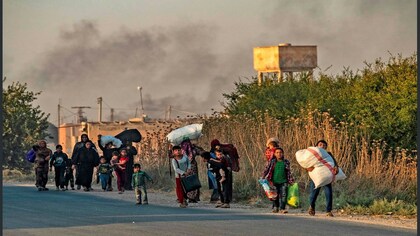Starving Iran Won’t Free It
21:12 - 7 March 2012

THERE’S an old saying, attributed to the British Foreign Office in colonial days: “Keep the Persians hungry, and the Arabs fat.” For the British — then the stewards of Persian destiny — that was the formula for maintaining calm; it still is for Saudi Arabian leaders, who simply distribute large amounts of cash to their citizens at the first sign of unrest at their doorstep.
But in the case of Iran, neither America nor Britain seems to be observing the old dictum. Keeping the Persians hungry was a guarantee that they wouldn’t rise up against their masters. Today, the fervent wish of the West appears to be that they do exactly that. Except that the West is doing everything in its power to keep the Iranians hungry — even hungrier than they might ordinarily be under the corrupt and incompetent administration of Mahmoud Ahmadinejad.
It is no surprise that the March 2 election — Iran’s first national poll since the disputed one of 2009 — was held without any excitement on the part of middle-class voters or the participation of liberals opposed to the regime. Such candidates have been systematically eliminated from the political scene, accused of being Western stooges or traitors.
Western sanctions, once “targeted” and now blanket, are turning into a form of collective punishment. They are designed, we are told, to force the Islamic government to return to the nuclear negotiating table. Western politicians also seem to believe that punishing the Iranian people might lead them to blame their own government for their misery and take it upon themselves to force a change in the regime’s behavior, or even a change in the regime itself. But as the old British maxim recognized, deprivation in Iran is a recipe for the status quo.
Iran’s government and its people have never been isolationists. But as sanctions take their toll on the livelihoods of Iranians who want to continue to do business and communicate with the outside world, their energy to question their government’s policies and to agitate for change is waning. That means far fewer opportunities to promote American values and win minds, if not hearts (which we’ve had but are now in danger of losing).
Over the past year, while I was living in Tehran, I witnessed a faltering economy and a population hungry not just for protein but for change. Businesses that are closing or laying off workers for lack of commerce or new opportunities affect everyone from the office tea boy to the middle manager whose salary, if he or she still has it, might no longer be sufficient to feed a family.
The change that most Iranians are hungry for is economic, and while they are consumed with the struggle to make ends meet, work second and third jobs, and in some cases send their children into the streets to beg or sell knickknacks, they are less concerned with their secondary hunger: political change.
In Iran, political change cannot be brought about by coercion, sanctions or exiles and their enablers, despite what American politicians might think. Instead, it will come slowly — too slowly for an American election cycle, to be sure. And it will come only after Iranians are no longer hungry and the government has no excuses left, including national security, to deny the people’s civil rights.
Only when Iran’s educated, sophisticated and talented people “get fat” will they confront their leaders and demand their right to pursue a happiness beyond life and the satiated stomach. Allowing Iran to function normally in the economic sphere would empower ordinary Iranians more than the government and eliminate from its narrative the one mantra it knows resonates with all Iranians: that the West wants to dictate to Iran.
Iranians do not take kindly to being dictated to. It reminds a proud people of their nation’s weakness in the face of greater powers. Iranians will neither blame their own government for the effects of sanctions simply because we tell them to, nor will they overthrow the ayatollahs, however much we prod them to.
But with a strong economy, the middle class will return to a more influential political role in society. After all, it was most visible during the reformist years when relations with the West, political and economic, were at their best and when the government, under virtually no foreign threats, found it hard to completely ignore their demands.
Indeed, it was that same middle class, still well fed even after four years of Mr. Ahmadinejad’s rule, that rose up in 2009, demanding their civil rights. And it is what’s left of that middle class that continues to protest human and civil rights abuses today.
The ever more stringent sanctions imposed on Iran may be “biting,” but they are also stifling voices for change — voices that simply cannot be heard at a time when the population is threatened with an economic chokehold or, worse, with being bombed.
Sanctions will neither change the regime’s behavior nor ignite a Persian Spring — not as long as the Persians are hungry, and scared.
By: HOOMAN MAJD
Source – The New York Times
But in the case of Iran, neither America nor Britain seems to be observing the old dictum. Keeping the Persians hungry was a guarantee that they wouldn’t rise up against their masters. Today, the fervent wish of the West appears to be that they do exactly that. Except that the West is doing everything in its power to keep the Iranians hungry — even hungrier than they might ordinarily be under the corrupt and incompetent administration of Mahmoud Ahmadinejad.
It is no surprise that the March 2 election — Iran’s first national poll since the disputed one of 2009 — was held without any excitement on the part of middle-class voters or the participation of liberals opposed to the regime. Such candidates have been systematically eliminated from the political scene, accused of being Western stooges or traitors.
Western sanctions, once “targeted” and now blanket, are turning into a form of collective punishment. They are designed, we are told, to force the Islamic government to return to the nuclear negotiating table. Western politicians also seem to believe that punishing the Iranian people might lead them to blame their own government for their misery and take it upon themselves to force a change in the regime’s behavior, or even a change in the regime itself. But as the old British maxim recognized, deprivation in Iran is a recipe for the status quo.
Iran’s government and its people have never been isolationists. But as sanctions take their toll on the livelihoods of Iranians who want to continue to do business and communicate with the outside world, their energy to question their government’s policies and to agitate for change is waning. That means far fewer opportunities to promote American values and win minds, if not hearts (which we’ve had but are now in danger of losing).
Over the past year, while I was living in Tehran, I witnessed a faltering economy and a population hungry not just for protein but for change. Businesses that are closing or laying off workers for lack of commerce or new opportunities affect everyone from the office tea boy to the middle manager whose salary, if he or she still has it, might no longer be sufficient to feed a family.
The change that most Iranians are hungry for is economic, and while they are consumed with the struggle to make ends meet, work second and third jobs, and in some cases send their children into the streets to beg or sell knickknacks, they are less concerned with their secondary hunger: political change.
In Iran, political change cannot be brought about by coercion, sanctions or exiles and their enablers, despite what American politicians might think. Instead, it will come slowly — too slowly for an American election cycle, to be sure. And it will come only after Iranians are no longer hungry and the government has no excuses left, including national security, to deny the people’s civil rights.
Only when Iran’s educated, sophisticated and talented people “get fat” will they confront their leaders and demand their right to pursue a happiness beyond life and the satiated stomach. Allowing Iran to function normally in the economic sphere would empower ordinary Iranians more than the government and eliminate from its narrative the one mantra it knows resonates with all Iranians: that the West wants to dictate to Iran.
Iranians do not take kindly to being dictated to. It reminds a proud people of their nation’s weakness in the face of greater powers. Iranians will neither blame their own government for the effects of sanctions simply because we tell them to, nor will they overthrow the ayatollahs, however much we prod them to.
But with a strong economy, the middle class will return to a more influential political role in society. After all, it was most visible during the reformist years when relations with the West, political and economic, were at their best and when the government, under virtually no foreign threats, found it hard to completely ignore their demands.
Indeed, it was that same middle class, still well fed even after four years of Mr. Ahmadinejad’s rule, that rose up in 2009, demanding their civil rights. And it is what’s left of that middle class that continues to protest human and civil rights abuses today.
The ever more stringent sanctions imposed on Iran may be “biting,” but they are also stifling voices for change — voices that simply cannot be heard at a time when the population is threatened with an economic chokehold or, worse, with being bombed.
Sanctions will neither change the regime’s behavior nor ignite a Persian Spring — not as long as the Persians are hungry, and scared.
By: HOOMAN MAJD
Source – The New York Times



